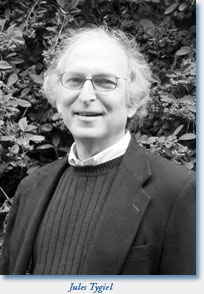 Jules Tygiel, a preeminent historian of American baseball, died in San Francisco on July 1, 2008, after a two-and-a-half-year battle against a neuro-endocrine tumor of the pancreas. He was 59 years old. Tygiel joined the history faculty at San Francisco State University in 1978.
Jules Tygiel, a preeminent historian of American baseball, died in San Francisco on July 1, 2008, after a two-and-a-half-year battle against a neuro-endocrine tumor of the pancreas. He was 59 years old. Tygiel joined the history faculty at San Francisco State University in 1978.
Jules Tygiel’s work on the history of baseball helped to legitimize sports history among historians and to show nonhistorians how sports can illuminate the past. His large and significant body of scholarly work was characterized by careful research, clear and graceful writing, and the selection of topics that speak not just to our understanding of our past but also of ourselves and our society.
Born on March 9, 1949, in Brooklyn, Tygiel was eight years old when the Dodgers moved to Los Angeles. His first book, Baseball’s Great Experiment: Jackie Robinson and His Legacy (1983), probes both the process of integration and its limits, and is as much about race as about baseball. As he explained, “The dynamics of interracial relationships among players, coaches, and managers provide rare insights into what occurs when nonwhites are introduced into a previously segregated industry.” Named to several “best book” lists, the book also received a Robert Kennedy Book Award. Tygiel’s articles on baseball were collected and expanded in Past Time: Baseball as History (2000) and Extra Bases: Reflections on Jackie Robinson, Race, and Baseball History (2002). Past Time shows how each generation of Americans has reinvented the national pastime to fit its own reality and perceptions. The New York Times named it a Notable Book of the Year, and the Society for American Baseball Research gave it the Harold Seymour Award in 2001, an award that recognizes “exceptional scholarship, superior writing skills, and the full range of conceptual, theoretical, investigative, and analytical skills employed by accomplished historians” with preference for “those who had broken new research ground.”
Tygiel’s work on California history began with his dissertation, “Workingmen in San Francisco, 1880–1901” (UCLA, 1977), which was published in 1992 as part of a series of outstanding dissertations. Barron’s said his The Great Los Angeles Swindle: Oil, Stocks, and Scandal in the Roaring Twenties (1994) “should be required reading for anyone interested in the history of American finance.” Tygiel’s most recent book is Ronald Reagan and the Rise of American Conservatism (2004), which one reviewer called “the most balanced account of Reagan’s life.”
Tygiel’s writing style and wry humor made him in demand for talk shows and as a speaker, including the keynote for the 1997 Symposium on Baseball and American Culture at the Baseball Hall of Fame. He also contributed op-ed pieces to the San Francisco Chronicle, Los Angeles Times, and others.
Tygiel received two awards from NEH and San Francisco State’s second annual Excellence in Professional Achievement Award.
At San Francisco State, Tygiel taught courses on U.S. history 1917–45, California history, baseball history, computer methodologies, and graduate seminars on the 1920s and 1930s. His students describe him as “a hard-working and generous mentor,” remembering that he “always pushed for an individual’s best work and shared his love of the life of the mind.” Richard Hoffman, chair of the history department from 2000 to 2007, said of Tygiel, “Jules gave so much to the department and his colleagues—as if we were part of his extended family. He tirelessly gave of his time and energy to things that really mattered, from hiring new colleagues to helping with their promotion and scholarship.” He was elected to nearly every departmental committee, the Academic Senate, and the University Promotions Committee. Tygiel also organized annual standing-room-only forums on the events of September 11, 2001, programs that steered clear of ideologies and partisan critiques and instead provided students and the public with thoughtful commentary.
In 1982, Jules Tygiel married Luise Custer. They have two sons: Charles, 24, and Samuel, 17. Jules was preceded in death by his father in 2006, and is survived by his mother. His vibrant mind and gentle spirit will long resonate in the hearts of colleagues, students, friends, and extended family. Donations can be made to Imagine Supported Living at www.imaginesls.org or Camphill Communities California at www.camphillca.org.
Robert W. Cherny
San Francisco State University